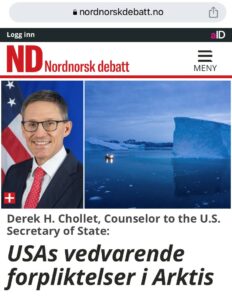Op-Ed: America’s Enduring Commitment to the Arctic

Op-Ed: America’s Enduring Commitment to the Arctic
By Derek H. Chollet, Advisor to the US Secretary of State
This comment was posted in Norwegian by Nordlys on March 30, 2023.
The United States is a proud Arctic state and takes our role as one of the stewards of the region seriously. With a new national strategy for the Arctic region and the creation of high-level positions to represent our interests, including the first-ever U.S. Ambassador for Arctic Affairs, we are committed to this vital and changing region – a region whose importance will only increase in grow in the coming decades.
Unfortunately, Russia’s brutal war against Ukraine has created a new geopolitical reality, including in the Arctic, where Moscow’s actions have upended decades of close circumpolar cooperation. While Putin chooses aggression and isolation, the United States is committed to keeping the Arctic peaceful, stable, prosperous, and cooperative.
The Arctic Council is at the center of our efforts and we will continue to work hard to ensure its effectiveness. For over a quarter of a century, the Council has brought together the eight Arctic states (Canada, the Kingdom of Denmark, Finland, Iceland, Norway, Russia, Sweden and the United States) and permanent participants (organizations representing the indigenous peoples of the Arctic). . A growing number of observers has enriched the Council’s work.
The Arctic Council’s mission excludes military security and frees it to focus on combating climate change, protecting the environment and ecosystems, and promoting sustainable development, in line with the commitments of the United States and our like-minded people allies in the region. The work of the Arctic Council has had a tangible and significant positive impact on communities, science and the environment.
For example, thanks to his work, we know that the Arctic is warming at least three times faster than the rest of the planet. Council members have formed legally binding international agreements on search and rescue, response to marine oil spills and scientific cooperation. The Arctic Council was the first, and so far only, intergovernmental forum to accredit indigenous peoples organizations with full participation and consultation status.
Unfortunately, Russia’s aggression had a significant impact on the Council. Because of Russia’s illegal invasion of Ukraine – during its chairmanship of the Arctic Council – the United States and our Arctic partners have suspended our participation in the Arctic Council. In June 2022, we resumed work on previously approved Arctic Council projects that never included Russian participation. These accounted for around 60 percent of the Arctic Council’s projects and enabled much of its important work to continue.
Now we are at a turning point.
The United States is attempting to revitalize the Arctic Council and strongly supports Norway as the future chairmanship. We must also recognize that Moscow’s blatant violation of the principles of sovereignty and territorial integrity – principles rooted in international law and also underlying the Arctic Council – has made cooperation with Russia virtually impossible for the time being.
But we are determined to find a way forward. We continue to invest in Arctic initiatives and communities. Our commitment to Arctic science collaboration – including data sharing – remains unchanged. Our work to address the impacts of climate change in the Arctic continues nationally, bilaterally and multilaterally. Our work with Arctic allies and partners to promote sustainable and transparent investment in the region is bearing fruit. And our consultations on security in the region are still based on the shared understanding that we aspire to a peaceful, stable, prosperous and cooperative Arctic region.
We invest at home to ensure we can represent US interests in the Arctic abroad. Our new Ambassador for Arctic Affairs, if confirmed by the U.S. Senate, will advance the policies we set out in our national strategy, work with Arctic and non-Arctic states and indigenous communities, and work closely with U.S. partners. including state, local and tribal governments, corporations, academic institutions, nonprofit organizations, other federal agencies and Congress. We’ve increased staff across the Department of State and our embassies to focus on arctic issues, launched new initiatives from critical minerals to education, and expanded our security cooperation. Importantly, US involvement extends beyond the State Department. The newly established Ted Stevens Center for Arctic Security in Alaska leverages the expertise of US experts, allies and our partners to improve understanding of the region.
The United States continues to fund our Arctic priorities. We have committed US$250 million to Port of Nome development, nearly US$1 billion to new polar safety cutters, nearly US$19 million to support clean energy development and governance of the mineral resource sector and sustainability goals in Greenland and $1 million to support the Arctic Council’s climate and environment work. These commitments come on top of the hundreds of millions in US government funding and support for research and science in the Arctic, particularly related to climate change.
Russia’s actions have imposed an unfortunate new reality on us, but they have not changed our commitment to the Arctic, to Arctic communities, or to Arctic cooperation. In fact, they have only reinforced our resolve to work with our partners in the Arctic Council and beyond to make the Arctic more prosperous, stable and secure.


